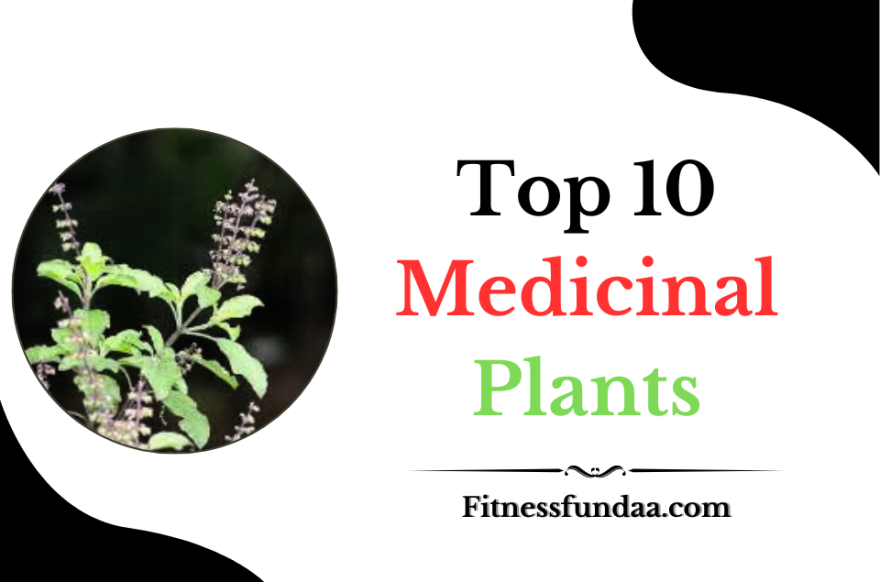Introduction:
Medicinal plants have been used for centuries to treat various ailments and promote over all health and well-being. Their natural properties offer a safer alternative to synthetic drugs, with fewer side effects. In this comprehensive guide, we will explore the top 10 medicinal plants, their benefits, and how they can be incorporated into everyday life for improved health out comes. Top 10 Medicinal Plants .Medicinal Plants .
Aloe Vera (Aloe barbadensis):
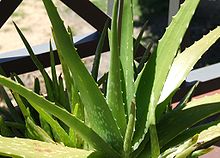
_image source : wikipedia
Brief Information: Aloe vera is a succulent plant known for its gel-filled leaves, which are rich
in vitamins, minerals, and antioxidants. It has been used for centuries to soothe burns, heal
wounds, and promote skin health.
Benefits: Aloe vera gel possesses anti-inflammatory, antimicrobial, and wound-healing
properties. It can be applied topically to treat sunburns, cuts, and minor skin irritations.
Additionally, consuming aloe vera juice may aid in digestion, promote detoxification, and
boost immune function.
Turmeric (Curcuma longa):
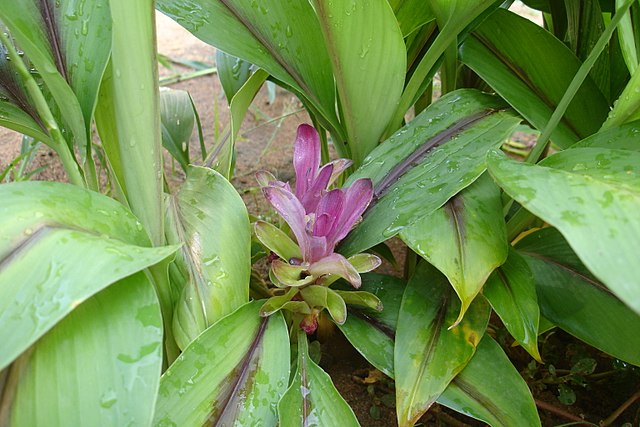
_image source : wikipedia
Brief Information: Turmeric is a spice derived from the rhizomes of the Curcuma longa plant.
It contains a bioactive compound called curcumin, which is responsible for its vibrant yellow
colour and numerous health benefits.
Benefits: Curcumin exhibits potent anti-inflammatory, antioxidant, and anticancer properties.
It may help alleviate symptoms of arthritis, promote heart health, and support cognitive
function. Turmeric can be consumed in powdered form, added to dishes, or taken as a
dietary supplement.
Ginger (Zingiber officinale):
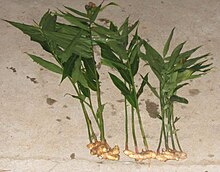
_image source : wikipedia
Brief Information: Ginger is a flowering plant valued for its rhizomes, which are commonly
used in cooking and traditional medicine. It has a distinct spicy flavor and aroma, making it a
popular ingredient in culinary dishes and herbal remedies.
Benefits: Ginger contains bioactive compounds such as gingerol, which possess anti-nausea,
anti-inflammatory, and antioxidant properties. It may help relieve nausea, alleviate digestive
issues, and reduce muscle soreness. Ginger can be consumed fresh, dried, or as a tea
infusion.
Garlic (Allium sativum):
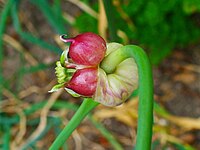
_image source : wikipedia
Brief Information: Garlic is a bulbous plant belonging to the Allium genus. It has been
cultivated for culinary and medicinal purposes for thousands of years, prized for its pungent
flavour and numerous health benefits.
Benefits: Garlic contains sulphur compounds like allicin, which exhibit antimicrobial, antiviral,
and immune-boosting properties. It may help lower blood pressure, reduce cholesterol
levels, and support cardiovascular health. Consuming raw garlic or garlic supplements
regularly may confer these health benefits.
Echinacea (Echinacea purpurea):

_image source : wikipedia
Brief Information: Echinacea is a flowering plant native to North America, commonly known
as purple coneflower. It has a long history of use in traditional Native American medicine for
its immune-stimulating properties.
Benefits: Echinacea contains bioactive compounds like polysaccharides and alkamides,
which enhance immune function and reduce the duration and severity of colds and flu. It
may also aid in wound healing and alleviate symptoms of respiratory infections. Echinacea
supplements are available in various forms, including capsules, tinctures, and teas.
Peppermint (Mentha × piperita):
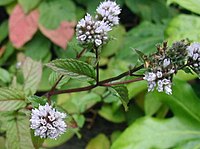
_image source : wikipedia
Brief Information: Peppermint is a hybrid mint plant known for its refreshing aroma and
cooling sensation. It contains menthol, a compound with analgesic and antispasmod
properties, making it a popular remedy for digestive issues and respiratory ailments.
Benefits: Peppermint oil is commonly used to alleviate symptoms of irritable bowel syndrome
(IBS), such as abdominal pain, bloating, and gas. It may also help relieve headaches, soothe
sore muscles, and improve mental clarity and focus. Peppermint tea can be brewed from
fresh or dried leaves and enjoyed hot or cold.
Ginseng (Panax ginseng):
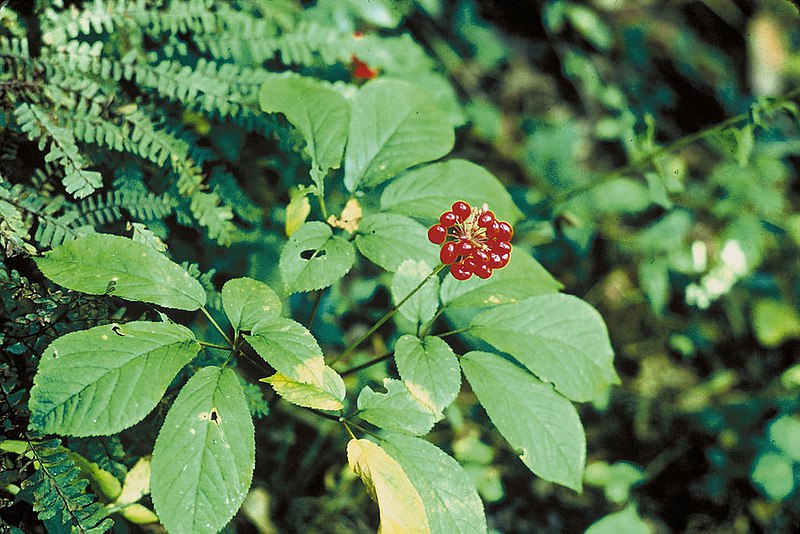
_image source : wikipedia
Brief Information: Ginseng is a perennial plant prized for its medicinal properties in traditional
Chinese medicine. It is available in various species, including Korean ginseng (Panax
ginseng), American ginseng (Panax quinquefolius), and Siberian ginseng (Eleutherococcus
senticosus).
Benefits: Ginseng is believed to possess adaptogenic properties, helping the body adapt to
stress and improve resilience. It may enhance cognitive function, boost energy levels, and
support immune health. Ginseng supplements are available in the form of capsules, extracts,
and teas.
Lavender (Lavandula angustifolia):
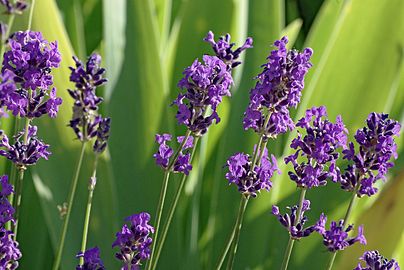
_image source :wikipedia
Brief Information: Lavender is a fragrant herb known for its calming and soothing properties.
It has been used for centuries in aromatherapy and herbal medicine to promote relaxation,
alleviate stress, and improve sleep quality.
Benefits: Lavender essential oil contains compounds like linalool and linalyl acetate, which
exert sedative and anxiolytic effects on the nervous system. It may help reduce anxiety,
promote relaxation, and improve sleep onset and duration. Lavender oil can be diffused,
applied topically, or added to bathwater for therapeutic purposes.
Chamomile (Matricaria chamomilla):
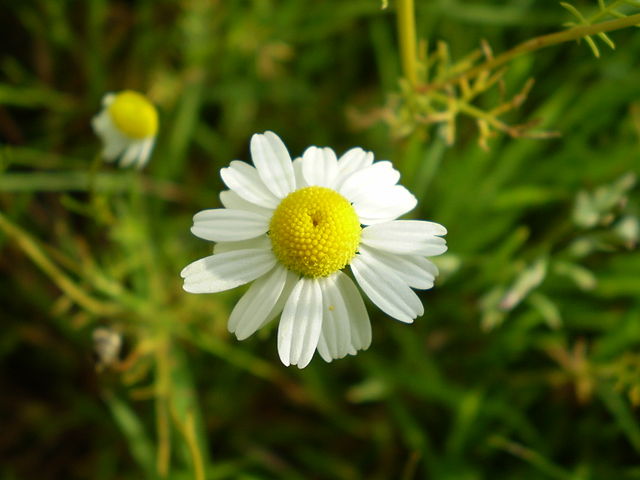
_image source : wikipedia
Brief Information: Chamomile is a flowering plant belonging to the Asteraceae family, prized
for its medicinal properties and delicate floral aroma. It has been used for centuries as a
natural remedy for various ailments, including insomnia, digestive issues, and skin
conditions.
Benefits: Chamomile contains bioactive compounds like apigenin, which possess
anti-inflammatory, antioxidant, and sedative properties. It may help alleviate symptoms of
anxiety, promote relaxation, and improve sleep quality. Chamomile tea is a popular herbal
remedy that can be enjoyed before bedtime to induce feelings of calmness and tranquillity.
Holy Basil (Ocimum sanctum):

_image source : wikipedia
Brief Information: Holy basil, also known as tulsi, is a sacred herb revered in Hindu culture
for its spiritual significance and medicinal properties. It has a long history of use in Ayurvedic
medicine for its adaptogenic and immune-enhancing properties.
Benefits: Holy basil contains compounds like eugenol and rosmarinic acid, which exhibit
anti-inflammatory, antioxidant, and antimicrobial properties. It may help reduce stress, boost
immune function, and support respiratory health. Holy basil tea can be brewed from fresh or
dried leaves and consumed regularly for its health-promoting effects.
Conclusion:
Medicinal plants offer a natural and holistic approach to health and wellness, providing a
wide range of benefits for both physical and mental well-being. From soothing skin irritations
to boosting immune function and promoting relaxation, the top 10 medicinal plants discussed
in this guide offer versatile solutions for various health concerns.
Incorporating these plants into your daily routine, whether through herbal teas, supplements,
or topical applications, can help you harness their therapeutic properties and improve your
overall quality of life.
However, it’s essential to consult with a healthcare professional before
using medicinal plants, especially if you have underlying health conditions or are taking
medication.
By embracing the power of nature’s pharmacy, we can unlock the healing potential of
medicinal plants and cultivate a healthier, more resilient body and mind.

